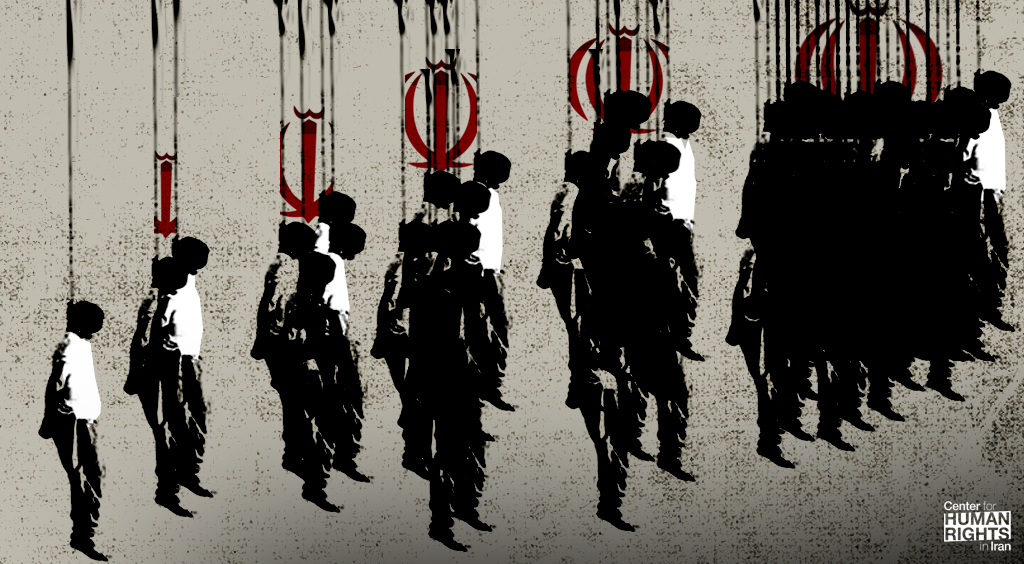 Juvenile offenders are among those reported to be hanged
Juvenile offenders are among those reported to be hanged
Three-quarters of the world's recorded executions last year took place in Iran
June 5, 2024 – Iran’s upcoming presidential elections following the unexpected death of Iranian President Ebrahim Raisi should not distract attention from the dramatic increase in executions and deepening human rights crisis in Iran that President Raisi led and promoted, the Center for Human Rights in Iran (CHRI) has warned.
“An orchestrated selection process disguised as an election should not obscure the reality in Iran, where men, women and children are being executed after sham trials to silence dissent, and executions are accelerating at a horrifying pace,” said Hadi Ghaemi, Executive Director of CHRI.
“Executions have become the cutting edge of Iran's repressive apparatus that tolerates no dissent,” Ghaemi said. “Shooting protesters in the streets, throwing peaceful dissenters to prison, and hanging more is the Islamic Republic's answer to Iran's outraged people.”
“Now, more than ever, international attention should be focused on Iran's use of the death penalty as a tool of repression, and not on the death of a president who was a central figure in the Islamic Republic's human rights violations, or on fraudulent elections in which all major opposition parties are barred from taking part,” Ghaemi stressed.
On May 30, 2024, six prisoners, including alleged juvenile offender Aref Rasouli, were transferred to a cell in Adelabad Prison in Shiraz, Fars Province, in preparation for their imminent execution. The only other person among the six who is publicly known is Morteza Sirmohammadi.
Sources told the Iranian Human Rights Group that Rasouli was just 17 at the time of the attack.
CHRI calls on governments around the world, especially those that oppose the death penalty, to demand that the Iranian government:
- Immediately moratorium on all executions and end arbitrary death sentences that do not comply with international law and standards. This must be accompanied by strong diplomatic and economic leverage.
- We comply with all international obligations, including the International Covenant on Civil and Political Rights and the Convention on the Rights of the Child, which strictly prohibit the execution of juvenile offenders.
- Ensure that all defendants are guaranteed full due process and the right to a fair trial, including the right to independent counsel, and order all courts to strictly adhere to Iranian law banning the use of coerced “confessions” in judicial proceedings.
- The international community should vigorously pursue human rights sanctions against complicit judicial officials in the Islamic Republic, with a particular focus on those involved in handing down death sentences to minors and political prisoners.
According to the International Covenant on Civil and Political Rights (ICCPR) and the Convention on the Rights of the Child, it is illegal to execute someone under the age of 18 for a crime. Iran is a party to both treaties, but is one of the few countries that continues to execute minors in violation of its treaty obligations.
According to Amnesty International, at least 853 people were executed in Iran in 2023, three-quarters of the world's recorded executions and a 48% increase from the 576 known executions in 2022.
Executions have disproportionately affected Iran's Baluchi minority, who account for 20% of recorded executions despite making up approximately 5% of Iran's population. At least 171 Baluchi citizens were executed in prisons across Iran between March 2023 and March 2024, according to a report by the Baluchi Harbush Human Rights News Service. Ethnic and religious minorities in Iran have long been subject to particularly harsh punishments, including the death penalty.
Iran remains an outlier globally in executing minors, despite the practice being strictly prohibited under international law. According to Amnesty, at least five people executed in Iran in 2023 were minors at the time of the crime. Additionally, at least 24 women have been executed in Iran in 2023.
In Iran, the death penalty is also carried out for crimes that do not meet internationally recognized standards. Internationally recognized standards allow for the death penalty only for the most serious crimes. For example, at least 545 of the recorded executions were for drug-related crimes, robbery, and espionage. In particular, there has been a sharp increase in executions for drug-related crimes, accounting for 56% of all recorded executions in 2023, an 89% increase from the 255 recorded in 2022.
The unlawful executions of juvenile offenders continue in 2024. Just a few weeks ago, on May 18, 2024, 22-year-old Ramin Saadat, who was only 17 when he was arrested on suspicion of murder, was hanged in Mi'andab Central Prison.
All of these executions, including those of children, have been carried out following prosecutions that have blatantly denied due process rights, including the right to independent counsel, and convictions have routinely been based solely on “evidence” extracted under torture and later retracted in court.
“Iran's judicial process is a tool of the intelligence and security services,” Ghaemi said. “They execute people to terrorize and silence the population.”
“The international community must speak out swiftly, forcefully and with one voice to demand an end to the state-sanctioned murderous practices that are accelerating with impunity in the Islamic Republic,” Ghaemi said.

